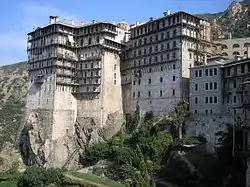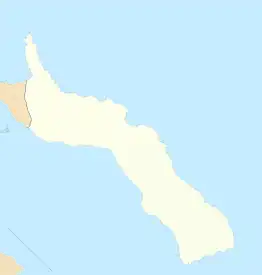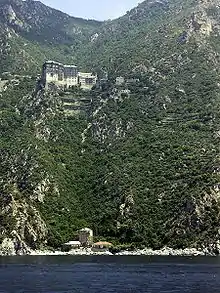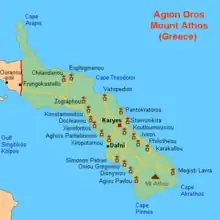Simonopetra
Simonopetra Monastery (Greek: Σιμωνόπετρα, literally: "Simon's Rock"), also Monastery of Simonos Petra (Greek: Μονή Σίμωνος Πέτρας), is an Eastern Orthodox monastery in the monastic state of Mount Athos in Greece. It ranks 13th in the hierarchy of the Athonite monasteries.
Σιμωνόπετρα | |
 Southern view of the monastery. | |
 Location within Mount Athos | |
| Monastery information | |
|---|---|
| Full name | Holy Monastery of Simonopetra |
| Other names | Simonos Petra |
| Order | Ecumenical Patriarchate |
| Established | 13th century |
| Dedicated to | Nativity of Jesus |
| Diocese | Mount Athos |
| People | |
| Founder(s) | Simon the Athonite |
| Prior | Archimandrite Elder Eliseus |
| Site | |
| Location | Mount Athos, Greece |
| Coordinates | 40°11′23″N 24°14′44″E |
| Public access | Men only |
It is on the southern coast of the Athos peninsula, between the Athonite port of Dafni and Osiou Grigoriou monastery. While the southern coast of Athos is generally quite rugged, the site upon which the monastery is built is exceptionally harsh. It is built on top of a single huge rock, practically hanging from a cliff 330 metres over the sea.[1] It currently houses 54 monks. Its hegumen is Archimandrite Eliseus.
History
The monastery was founded in the 13th century by Simon the Athonite, who was later sanctified by the Eastern Orthodox Church as Saint Simon the Myrrh-bearer. Tradition holds that Simon, while dwelling in a nearby cave, had a vision where the Theotokos instructed him to build a monastery on top of the rock, promising she would protect and provide for him and the monastery. Simon called the original monastery "New Bethlehem" (Greek: Νέα Βηθλεέμ); to this day, it is dedicated to the Nativity of Jesus.
In 1364, the Serbian despot Jovan Uglješa funded the monastery's renovation and expansion, issuing a royal chrysobull for it in 1368.[2]
Russian pilgrim Isaiah wrote that, by the end of the 15th century, the monastery was Bulgarian.[3]
In 1567, the arsanas (port building) of Simonopetra was completed. Its construction was funded by a Wallachian noble.[4]
In 1581, Simonopetra was destroyed by a fire, in which a large portion of the monks died. Evgenios, the monastery's abbot traveled to the Danubian Principalities hoping to raise funds to rebuild the monastery. The most important donor was Michael the Brave, Prince of Wallachia, who donated large portions of land as well as money to the monastery. The monastery was also burnt in 1626, and the last great fire happened in 1891, after which the monastery was rebuilt in its current form.
In recent centuries, the monks of the monastery were traditionally from Ionia in Asia Minor. However, during the mid-20th century, the brotherhood was greatly reduced by a reduction in the influx of new monks. The current brotherhood originates from the Holy Monastery of Great Meteoron in Meteora, when in 1973 Emilianos (Vafidis) (also known as Aimilianos of Simonopetra) and his monks moved into Simonopetra, hence repopulating the almost abandoned monastery. He served as Abbot of Simonopetra from 1974 until 2000.[5]
20th-century saints associated with the monastery include Ieronymos of Simonopetra (d. 1957).[6]
Architecture
The monastery consists of several multi-storeyed buildings, the main being in the place of the original structure, built by Simon. The main building has been described as the "most bold construction of the peninsula".[7] The monks of Simonopetra traditionally count the floors from top to bottom, thus the top floor is the first floor and the bottom floor the last. The monastery is built on top of the underlying massive rock, and the rock runs through the lower floors.
The expansion and development of Simon's original structure almost always followed one of the monastery's great fires. Following the 1580 fire and with the funds gathered by abbot Evgenios, the western building was erected. The eastern building was built following the 1891 fire mostly with funds raised in Russia.
Choir
The choir of Simonopetra has grown in reputation among Byzantine music specialists and enthusiasts. The monastery has published a series of collections of ecclesiastic Byzantine chants by the choir. Of these, Agni Parthene is the most popular and has earned the choir and the monastery widespread recognition.
Recordings include:[8]
- Hymns from the Psalter (1990)
- O Pure Virgin (Agni Parthene) (1990)
- Divine Liturgy (1999)
- Great Vespers (1999)
- Paraklesis (1999)
- Service of Saint Simon (1999)
- Sunday Matins (Orthros) (1999)
- Service of St. Silouan the Athonite (2004)
Gallery
 Simonopetra
Simonopetra Simonopetra
Simonopetra Simonopetra
Simonopetra Monastery and Aqueduct of Simopetra, 1834
Monastery and Aqueduct of Simopetra, 1834 View of Simonopetra from the sea
View of Simonopetra from the sea
References
- mountathos.gr Archived 2007-01-08 at the Wayback Machine
- Speake, Graham (2014). Mount Athos: renewal in paradise. Limni, Evia, Greece: Denise Harvey. p. 74. ISBN 978-960-7120-34-2. OCLC 903320491.
- A. E. Bakalopulos (1973). History of Macedonia, 1354-1833. [By] A.E. Vacalopoulos. p. 166.
At the end of the 15th century, the Russian pilgrim Isaiah wrote that the monks supported themselves with various kinds of work, including the cultivation of their vineyards, and that nearly half the monasteries were Slav or Albanian. As Serbian he instanced Docheiariou, Grigoriou, Ayiou Pavlou, a monastery near Ayiou Pavlou and dedicated to St. John the Theologian (no doubt meaning the monastery of Ayiou Dionysiou) and Chilandariou. Panteleïmon is Russian, Simonopetra is Bulgarian, and Karakallou and Philotheou are Albanian. He mentioned Zographou, Kastamonitou (see fig. 58), Xeropotamou, Koutloumousiou, Xenophontos, Iveron and Protaton without any designations; while Lavra, Vatopedi (see fig. 59), Pantokratoros, and Stavronikita (which founded shortly prior by the patriarch Jeremiah I), he specifically named as Greek (see map 6).
- Speake, Graham (2014). Mount Athos: renewal in paradise. Limni, Evia, Greece: Denise Harvey. p. 112. ISBN 978-960-7120-34-2. OCLC 903320491.
- Dorobantu, Marius (2017-08-28). Hesychasm, the Jesus Prayer and the contemporary spiritual revival of Mount Athos (Master's thesis). Nijmegen: Radboud University. Retrieved 2022-08-28.
- Elder Joseph the Hesychast, Three Other 20th-Century Athonite Elders Canonized. Orthodox Christianity. Mt. Athos, October 21, 2019.
- Greek Ministry of Culture Archived 2006-10-29 at the Wayback Machine
- "Χορός Σιμωνόπετρας / Choir of Simonopetra". YouTube. 2022-06-09. Retrieved 2022-06-12.
External links
- Simonopetra monastery at the Mount Athos website (Internet Archive)
- Liturgica.com: the recordings of the choir of Simonopetra
- Youtube: The recordings of the Choir of Simonopetra
- History of monastery (grec.)
- Choir of Simonopetra (Χορός Σιμωνόπετρας), album recordings on YouTube

